
Székesfehérvár is the largest city and the county seat of Fejér county, Hungary. It's roughly 60 km southwest of Budapest, and is considered Hungary's first, as this was the royal seat of King Szent István (also known as Saint Stephan). Though most of the medieval city was destroyed by the Turks, it was rebuilt to glory under Maria Theresa Habsburg. The city is between Lake Velence and Lake Balaton, making it an ideal stop-off between the two.
Places outside of the city that are in the district of the same namexare listed in the and Székesfehérvár district article.
Understand
[edit]Székesfehérvár (Latin Alba Regia) is one of the most ancient towns in Hungary.
During his principality (972 - 997) Géza, the Grand Duke, established Székesfehérvár as his princely dwelling on the hills surrounded by swamps and therefore considered safe. His palace was fortified by ditches and ramparts, and the Byzantine-style, quatrefoil church, which was one of the first Hungarian stone built churches and later served as his resting-place.
During the reign of King St Stephen (1001 -1038) it was a populous and extended settlement, surrounded by palings and walls built of soil. King Stephen's basilica was built in this time. It was one of the most monumental buildings in Europe at that time.
In the 12th century there were great building operations in Székesfehérvár. The monks settling in the city and the inhabitants enriched Alba Regia by building pompous churches, monasteries, and dwelling houses. The construction of Saint Peter's cathedral - next to Saint Peter's church, built under the principality of Géza - was started in the 13th century. King Béla IV was crowned in this cathedral. The city was fenced with walls in the 14th century.
The Turks occupied the strategically important town in 1543 and kept it under their rule for 145 years.
In 1703 the city regained its title as a free royal city. In the 1720s major construction were started: first the Franciscans then the Carmelites built churches, and under the rule of Maria Theresa there were Baroque-, rococo-, and so called copf-style town-houses built.
In 1800s the first Hungarian and German primary school opened its gates, the education was started at the Jesuits' secondary school, and this town was the first to embrace the cause of the Hungarian theatrical art.
In 2014, it was home to 98,000 people.
- 1 Tourinform (Tourinform Iroda, Fehérvári Ajándékbolt), Oskola u. 2-4 (Center), ☏ +36 22 537261, szekesfehervar@tourinform.hu.
Get in
[edit]By train
[edit]
- 1 Train Station. There are very frequent rail services from Budapest. First, there is an hourly commuter train service (labelled személy) to Székesfehérvár, stopping at almost every station (although, between Kelenföld and Érd felsö it only stops in Budatétény) and taking 80 minutes to arrive. Second, there is an hourly intercity rail service (labelled gyors and not InterCity) running to Szombathely and Nagykanizsa alternately, stopping only at Kelenföld on its way and taking 65 minutes to arrive. All trains depart from the Budapest-Déli station and to not serve the Nyugati and Keleti stations. Check the timetable at MÁV's website. The train station is roughly 1 km south of the town centre and can easily be walked. Alba Volán [dead link] runs frequent bus connections to the town centre. One last option is to use City Taxi, at +36 22 311111.
By bus
[edit]- 2 Bus Station (Székesfehérvár autóbuszállomás), Piac tér 30 (south of Piac square and a short walk around the corner to the old town centere), ☏ +36 22 514714. Prebooking cashdesk open: M-F 05:30-19:00 (first week of the month), Sa 07:00-14:00, in second half of the month only till 18:00 and 12:00. Direct connections from Budapest, Népliget bus station. The journey takes roughly 1 hr 15 min. Prices are exactly the same for the bus and for the train. The only advantage then to taking a bus instead of the train would be that the city bus station is located exactly in the downtown. Buses to Pápa (between 08:00 and around 19:00, hourly, about 2 hours).
By car
[edit]The M7 runs just south of Székesfehérvár and is the fastest way to arrive. From the exit merge onto 63 which will eventually take you into Piac Square.
By taxi
[edit]Because the city is 60 km out of Budapest this is by far the most expensive option. If, however, you are arriving at Ferihegy and are going directly to Székesfehérvár, Zona Taxi offers a fixed rate of Ft 20 000.
Get around
[edit]Buses only accept cash on board.
If you are going to Bory's Castle you will need to travel either by car or bus. From the bus station take bus #26 or #26A and from the train station #32. Make sure to tell the bus driver you're going to Bory Vár because none of the buses will take you directly there and you won't know otherwise when to get off.
See
[edit]Churches
[edit]- 1 St Anna Chapel (Szent Anna kápolna), Arany János utca (next to the Szent István Cathedral). Szent Anna's is one of the few medieval buildings left untouched by the Turks. The church was constructed in 1470 in a Gothic style.
- 2 Bishops Palace (Püspöki Palota), Városház tér. 5 (Center), ☏ +36 22 510694. This large pile dominates Városház square and but basically made in Baroque style is there are some Cpof element that way this is one of Hungary's most important Copf style buildings. The palace was constructed in 1800-1801 from ruins of the former cathedral in the Ruin Garden exactly made from ruins of the former Holy Mary Provost (Coronation) Church.
- 3 the Saint István Cathedral (Szent István székesegyház), II. János Pál pápa tér / Arany János utca 9 (Centre), ☏ +36 22 315114, szfvar054@szfvar.katolikus.hu. Built in 1235 by King Béla IV, who was later crowned there. Most of what you see today, however, was from after 1777, when the cathedral became the episcopal seat. The interior is baroque in style and the towers were begun at the beginning of the 19th century.

- 4 [formerly dead link] Medieval Ruin Garden (Középkori Romkért, the ruins of the Basilica of Our Lady,Nagyboldogasszony-bazilika romjai), Koronázó tér, Várkörút 5. (the ruins can be seen in the middle of Székesfehérvár), ☏ +36 22 315583. A national memorial on Koronázó tér, just east of the main square. In the middle ages this was the site of Hungary's most important church and had it not been for the Turks blowing it up. Here is the ruins of the main church of the medieval Hungary, Here stand the basilica dedicated to the Virgin Mary, it would be to Hungary what Westminster Abbey is to England. The church was begun in 1016 under Hungary's first Christian king, Szent István. At the time, Székesfehérvár was the capital of the kingdom, and this church was the site of numerous coronations. In addition, from 1038 to 1543 fifteen Hungarian kings were put to eternal rest here (starting with Szent István himself and ending with Szapolyai János). As already mentioned, the church was destroyed by the Turks in 1601 and in 1800 the remains were used to build the Bishops Palace on nearby Városház square. Today all that remains of the once great basilica are stone walls outlining its form. The big draw, however, is to visit the mausoleum containing Szent István's sarchaphogus. This was discovered in 1803 during the building of the Bishop's Palace. The cherubic forms on the outside and royal relics contained within clearly identified this as the tomb of Szent István. The sarchaphogus originally was taken to the National Museum in Budapest, but was brought back to Székesfehérvár in 1936, and since then has remained in the attractive mausoleum at the entrance of the garden. Photography is not allowed in the mausoleum.
- St. Christopher parish church (Maros Mountain - Maroshegy - Szent Kristóf plébánia), Batthyány u. 4 (Maroshegy), ☏ +36 22 316461, +36 30 3228227 (Mobil).
- St. Donat Chapel (Szent Donát-kápolna).
- Our Lady of Hungary parish church (Székesfehérvár-Öreghegy - Magyarok Nagyasszonya plébánia), Budai út 224, ☏ +36 22 304-085.

- 5 St. Emeric Church (Szent Imre templom), Városház tér 4? (Centre).
- 6 St. John of Nepomuk Church (Nepomuki Szent János templom), Fő utca / Szent János köz 1 (Center), ☏ +36 22 315447.
- 7 St. Joseph's Church (Szent József templom- Szeminárium - Kármelhegyi Boldogasszony), Petőfi Sándor utca 2. (Centre), ☏ +36 22 315328.
- 8 Watertown Church (Heart of Jesus Church, Vízivárosi Jézus Szíve plébánia Templom), Rákóczi u. 32, ☏ +36 22 315-444, fax: +36 22 315-444.
- Upper City - Saint Sebastian the Martyr parish (Székesfehérvár - Felsőváros - Szent Sebestyén vértanú plébánia), Móri út 20, ☏ +36 22 315-482, nyhi@szfvar.katolikus.hu.
Museums
[edit]
- 9 King St. Stephen Museum (Szent István Király Múzeum), Fő utca. 6 / Országzászló tér 3 (Centre), ☏ +36 22 315583. The main city museum is the King St. Stephen Museum, which operates in several different branches and exhibitions throughout the city. An exhibition of the history includes objects from thousands of years in Fejér county. The Archaeological exhibition covers the Neolithic age to the Turkish era. There are also precious stone carvings from the Royal Basilica. The Roman Age Lapidarium contains 2nd- to 4th-century tombstones, a sarcophagus, an altar, and fragments of the emperor statue from different part of the Fejér county.
- 10 [formerly dead link] Archaeological Exhibition (Régészeti Kiállítás), Fõ út 6 (Centre), ☏ +36 22 315583. W-Su 10:00-18:00. Adjacent to the King St. Stephen Museum. Ft 700 (2014).
- 11 [formerly dead link] Csók István Picture Gallery (Csók István Képtár, City Gallery), Bartók Béla tér 1 (Centre), ☏ +36 22 314106. Temporary exhibition: M 13:00-18:00, Tu-Su 10:00-18:00. The main attraction of the Csók Picture Gallery is a painting by Vilmos Aba–Novák, entitled the Hungarian-French historic relations. Vilmos Aba-Novák was brilliant Hungarian painter in the 1930 -40s. This panel painting was pride of the Hungarian pavilion at the Paris World Exhibition in 1937 and was awarded the Jury with Grand Prix. According to one anecdote, Picasso when seeing the picture impressed cried: "Who is this barbaric genius?". The work can be seen in the Csók Picture Gallery only once a year. Ft 700.
- 12 [formerly dead link] Budenz House (Budenz Ház - Ybl-gyűjtemény), Arany János utca 12 (Center), ☏ +36 22-317027, +36 22 315583. Can be visited only by appointment. The civil Fehérvár imprint of the late baroque Budenz House. This is the private art collection of Ybl Ervin. His Scottish Art Nouveau-style study dazzles the art lovers. Excellent value.

- 13 [formerly dead link] Black Eagle Pharmacy Museum (Fekete Sas Patikamúzeum), Fő utca 6 (Centre), ☏ +36 22 315583. Tu-F 10:00-14:00, Sa Su 14:00-18:00. The Black Eagle Pharmacy stands on the site of the town's first pharmacy (1688 to 1971). It now houses a museum. In 1745 the Jesuits purchased the building for Ft 1200 from heirs of the apothecary, Johann Mehler. The interior is very beautiful with carved and fitted furniture made by a Jesuit brother. The museum's exhibits include instruments and containers used in the past by pharmacists to make their preparations. The items of equipment, turned wooden jars, large tincture press and inscribed in a mortar are all from the time of the Jesuits. Ft 500.
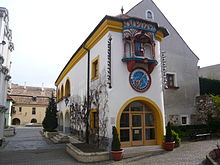
- 14 Clock Museum (Óramúzeum), Kossuth Udvar (Center), jenokovacs@t-online.hu. Only by appointment.
- 15 City Gallery - Deák Collection (Városi Képtár - Deák Gyűjtemény), Oskola utca 10 (Center), ☏ +36 22 329431. The museum is in a historic building in the small Esterházy Palace The collection shows from the 1900s up to 1980s the development of Hungarian painting. About 400 works are on displayed. These include Rippl-Ronai, Mednyánszky, The Eight, Egry and Czóbel works well.
- 16 [formerly dead link] Erzsébet Schaár Collecion (Schaár Erzsébet Gyújtemény), Jókai utca 11 entre Oskola utca 10 (Centre), ☏ +36 22 329-431. Closed (2014). Ft 500.
- 17 [formerly dead link] Doll Museum (Fehérvári Babaház Téglakiállítás), Megyeház u. 17 (Centre). 63 dollhouse displays spread over seven rooms. The collection contains dolls and dollhouses from the 17th to the 20th century. The displays are sure to delight both adults and children, and there's a large display of old military toys set up defending a castle. Photography is not allowed in the museum.
- 18 Diocesan Museum (Egyházmegyei Múzeum), Városház tér 4 (Centre), ☏ +36 22 510-698, +36 22 510699. The museum's permanent exhibition shows the valuable liturgical artefacts and religious relics of the Diocese of Székesfehérvár. One of the main sight is the head relic of Saint Stephen, an ornate silver herm.
- 19 [formerly dead link] Ethnography Collection of St. Stephen Museum (Szent István Király Múzeum Néprajzi Gyűjteménye), Országzászló tér 3 (Centre), ☏ +36 22 398083. W-Su 10:00-18:00. Folk art by present folk artists from Fejér county. See merchandise offerings of the gingerbread seller, the crockery vendor, vendor goose hindquarters! Permanent exhibition Ft 900, temporary exhibitions Ft 700, combined Ft 1400.
- 20 [formerly dead link] New Hungarian Gallery (Új Magyar Képtár), Megyeház u. 17 (Center), ☏ +36 22 329504. Tu-Su 10:00-18:00. The most famous Hungarian painters works are here. Shows in chronological order of the most important artists and phenomena of the 19th century to the present. Ft 700 (2014).

- 21 [formerly dead link] Open Air Museum of Palotaváros (Palotavárosi Skanzen, Serbian skanzen), Rác utca 11 (Slight west of the downtown). Smaller than other Hungarian open air museums. 12 thatched peasant houses and a Byzantine-style church depict day to day life of Serbian immigrants living on Rác street (Rác is the old Hungarian word for Serb). The first section contains the family room and kitchen (make sure to look straight up at the darkened chimney where they used to dry sausage). The next section depicts the family's hat shop, and the final section contains various mementos from the street's former residents.. Photography is not allowed in the museum.
- 22 Hetedhét Toy Museum (Hetedhét Játékmúzeum), Oskola utca 2-4 (Centre, in Hiemer-house), ☏ +36 22 202-601. The museum's toy collection represents an unrivaled value not only in Hungary but in Europe.
- 23 Pelican Gallery (Pelikán Galéria), Pelikán yard, Kossuth utca 15. (Center), ☏ +36 22 340-364. An one-storey house in Székesfehérvár. It used to be the Pelican Inn. Built in Baroque style in 1756. In the courtyard Was the theater hall, here was guest starred Sándor Petofi, great Hungarian poet.
Monuments
[edit]- 24 Arpad bath (Árpád fürdő), Kossuth utca (Center). This domed monument bath built in 1905, in Art Nouveau style, decorated with shell. After careful reconstruction was opened to the public in the spring of 2010.
- 25 Aunt Sue statue (Kati néni szobra), Liszt Ferenc utca (Downtown). 24/7. She is a good acquaintance of the local people. Aunt Katie, the city was once a well-known and beloved fresh product seller of green market. The townspeople hope good luck if touching the statue, this reason, the nose of the statue is shiny polished. Free.
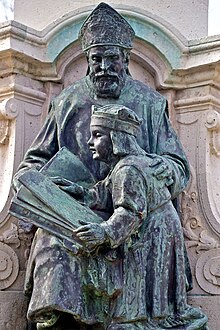
- 26 Bishop wells (Püspökkút, Várfal Park), Piac tér (Downtown). 24/7. The Bishop's well stand in a field in front of the castle wall. Jeno Bory was the sculptor. At the top stands a knight holding a sword aloft, and on the pedestal are four bronze statues, depicting famous Hungarian bishops. Free.
- 27 Clock Game (Órajáték), Kossuth udvar (Downtown). Legendary Kings of Hungary together with other well-known historical figures play out the hours. First show is at 10:00, and thereafter after every two hours. The display is accompanied by music.
- 28 City Hall (Városháza), Városház tér 1 (Downtown), ☏ +36 22-537200. The right wing of the building since 1698 recorded as a town hall. A monumental work by Vilmos Aba-Novák.
- Country Flag (Országzászló), Országzászló tér (Downtown).
- 29 County Hall (Megyeháza), Szent István tér (Center). The County Hall was built between 1807-1812 in classical style. The facade designed by Michael Pollack. In the construction used the southern bastion stones of the medieval castle. In the Knight hall of upstairs can be found portraits of the former Hungarian rulers.
- Dancer (Táncosnő), Kossuth utca (Downtown). The sculptor was Medgyessy Ferenc (1881-1958). The original statue was made in 1954, and is located in Budapest on the Madach Square. The Székesfehárvár's copy erected in 1984, following its donation by the sculptor's widow.
- 30 Domokos Kalmáncsehi statue (Kalmáncsehi Domokos szobra), II. János Pál pápa tér (Downtown, by Cathedral west side). A Béla Ohmann creation. Made of Haraszt's limestone. It commemorates to a 15th century, outstanding humanist scholar, who was a provost of the city and the cathedral's guardian. For a long time it was believed that he built the chapel of St. Anne for that the statue's left hand is located on a miniature replica of the chapel.
- 31 Fejér County Archives (Fejér Megyei Levéltár), Szent István tér (Center).
- 32 Flower clock (Virágóra), Fő utca (Downtown). This floricultural work is renewable from year to year, an interesting sight of the city. From spring to autumn show the precise time. The date is displayed next to the clock is always right!
- 33 Globus crucifer (Országalma), Városház tér (Downtown). a stone image of the royal symbol of power of the same name. This statue is one of the kings of Hungary crowning badges. Béla Ohmann work official title is the "Fehérvári law" . The circumferential inscription in Latin means "Fehérvár is a free city, of Saint Stephen's mercy."
- God's Eye House (Istenszemes ház), Megyeház utca (Centre). Protected monument.
- 34 Grand Prince Géza statue (Géza nagyfejedelem szobra), Géza nagyfejedelem tér (Downtown). In 1972 was inaugurated the city founder Grand Prince Géza life-size statue. At this time was 1000 year-old the city. The scaled floor plan of Church of Geza can be see on the statue's base. The statue wss made in 1972 by Meszlényi János.
- 35 Fountain Csitáry in the Rose Park (Rózsaliget a Csitáry-kúttal). Iron-rich mineral called sour water flows, and the season is hanging chimes every hour.
- 36 Hiemer House (Hiemer-ház), Városház tér/Oskola u. 2-4 (Center). An 18th-century Baroque-Rococo-style building. Three separate houses converted into one house. It is now a Marriage hall.
- Hotel Magyar Kiraly (Hotel Magyar Király), Fő utca (Center). Protected monument.
- Hungary's oldest residential house (Magyarország legrégebbi lakóháza), Jókai Street (Centre). 13th century.
- 37 Millennium memorial sign (Milleniumi emlékjel), Városház tér (Downtown).
- 38 King Matthias memorial (Mátyás király emlékmű), Fő utca / Ady E utca cnr (Downtown). One of the jewels of the Main street. This monument made by Miklós Melocco. It was created for 500th anniversary of King Matthias's death in 1990. The sculpture serves as a drinking fountain.
- 39 Mujkó statue (Mujkó szobra), Városház tér (Downtown). 24/7. Mujkó, the clown statue of Székesfehérvár"s Városháza Square. This cheerful statue since 2007, receives the visitors. Made by Kocsis Balázs sculptor to the annual contemporary art festival. Free.
- 40 St. Stephen's mausoleum (Szent István mauzóleum), Koronázó tér (Centre).
- Zichy Palace. Zopf style manor house, 1781.
- 41 Turkish Yard (Török udvar), Jókai utca 2. (Centre). Steam ruins from the 14th century. Until 1980s were hidden.
- 42 World War II Memorial (II. világháborús emlékmű), Városház tér (Downtown). The tower of Cistercian church in the Second World War was bombed. The bell of the Cistercian church fell to the ground. The monument symbolizes a bomb crater with a damaged bell in the middle.
- 43 Statue of György Varkoch (Varkocs-szobor), Fő utca and Varkocs utca cnr (Downtown). The statue of George Varkoch a former castle's captain stands by the edge of the pool water on a pedestal what made the stones from the old city wall. He died a hero's death, the 1543 siege of the city when- according to legend - the defenders closed in front of the castle gate.

- 44 Equestrian statue of St. Stephen (Szent István lovasszobra), Szent István tér (Downtown). Swedish black granite plates wrapped equestrian statue. A Sidló Ferenc work. In 1938 was inaugurated 900 year after the death of the first Hungarian king.
- Playing boys (Játszó fiúk), Lakatos utca (Downtown).

- 45 Prohászka memorial (Prohászka Ottokár emlékmű), Prohászka liget, Várkörút (Downtown).
- 46 St. Ladislaus bust (Szent László mellszobra), Prohászka liget, Várkörút (Downtown). Established in 1995 as a memorial statue of St. Ladislaus king of coronation. He initiated the canonisation of King Stephen in 1083. A Laszlo Schwalm art creation.
- 47 Statue of Francis Wathay (Wathay Ferenc szobra), Prohászka liget, Várkörút (Downtown). Sculptor: Elek Lux, made in 1937. Ferenc Wathay was the Vice-captain in 1602 year siege with Turkish. According to contemporary chronicles, the captain caught the Turks a few meters from the current location of the statue.
- 48 Statue of Saint Emeric (Szent Imre szobra), Oskola utca (Downtown, near to Church of Saint Emeric). The prince, who was buried and canonised in Székesfehérvár, it is said the palace was standing near the church.
- Statue of Louis the Great (Nagy Lajos szobra), Petőfi utca (Downtown).
- 49 Maulberthsch Fountain (Maulbertsch-kút), Megyeház utca (Downtown near to Megyeház tér). A drinking fountain for horses was here. This site was set up in 1930 to the present fountain in honor and commemorate of the great Baroque painter
- Golden Bull memorial (Aranybulla-emlékmű). the Golden Bull was an important charta by King Andrew II, it was released here; the memorial is from 1972.
- 50 Statue of Virgin Mary (Szűz Mária szobra), Géza nagyfejedelem tér (Downtown).
- Vörösmarty Mihály County Library (Vörösmarty Mihály Megyei Könyvtár), Bartók Béla tér. Protected monument.
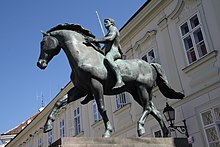
- 51 Tens Hussars monument (Tízes huszárok emlékműve), Városház tér (Downtown). The statue, on a pedestal with stone plates, shows a nude riding figure who holds a sword. An eternal memory about the Székesfehérvár's hussars whoose fell in World War I. The brilliantly placed monument is Pátzay Paul's work.
- 52 Vörösmarty Theater (Vörösmarty Színház), Fő utca. The oldest theater of the country. Laborfalvy Roza said here, on upstairs lounge, a thank-you speech. Aaron Lajos Nagy,-who born in Székesfehérvár, and Munkácsy Prize-winning painter- made a giant panel painting with a scene of 'Mihály Vörösmarty: Csongor and Tünde'.
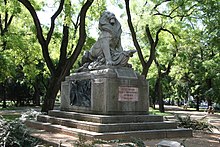
- 53 World War I memorial (I. világháborús emlékmű), Hősök tere (downtown, on sanctuary wall of the cathedral). Commemorating the World War II heroes. Janos Pásztor sculpture composition. The locals called the grave of a reclining soldier.
- Halesz park (Halesz park).
- 54 Kégl Palace (Kégl-kastély).
- Kisfaludi Palace (Kisfaludi-kastély).
- Zichy Park's music pavilion (Zichy ligeti zenepavilon), Zichy Park. There are every summer classical and pop music concerts. The pavilion erected by a famous Asia researcher, Zichy Jeno. In 1879, the pavilion was an iron foundry "stand" in the national exhibition of Székesfehérvár.
Further afield
[edit]
- 55 Bory Castle (Boryvar) (Located in an Eastern residential area). Closed during winter. The town's most popular attraction. Bory Castle a fantastic castle-like (really more of a mansion) structure built by the sculptor Jenő Bory and his wife themselves. The building took from 1923 to 1959 to build. Many of Bory's students worked on the castle under his supervision. Today the castle contains a wide range of architectural styles ranging from Scottish, Romanesque, and Gothic. Most of the complex is open to visitors, and you can freely climb the towers, and walk through the gardens and the sculptures--all originals by Bory. Inside are several galleries featuring Bory's paintings .
- Csók István Memorial House [formerly dead link] (Cece, Arany J. u. 1.) Closed due to technical reasons.
- 56 Füle (SW 20 km of Székesfehérvár, take any train toward Tapolca). Roman Catholic Church - Monument, Roman Catholic Parish - Baroque, Reformed Church, built in the late Classical style, Sárréti Country House. Monument House [formerly dead link] of Sarret (Füle, Széchenyi út 107.)
- 57 Kápolnásnyék (East of Velence Lake). Vörösmarty Memorial House [formerly dead link] (Kápolnásnyék, Vörösmarty u.), +36 22 709014; local history Exhibition, Reformed Church, Fishermen's mansion.
- 58 Nádasdladány (http://www.nadasdladany.hu/) (W 14 km of Székesfehérvár, take a bus or rent a bike). Nádasdy Palace with a Landscape Park Area 24 ha (1700s, reconstructed in 1870s), Roman Catholic Church (built between 1883-1885, in neo-Gothic style).
- 59 Pákozd (North Coast of Velence Lake). Bronze Age earth fortification remains, Exhibition of the Pákozd-Sukoro Battle [formerly dead link] (Pákozd, Mészeg-hegy), Pákozd-Sukoro Arboretum, Pákozdi-movable stones nature reserve (Extension: 44 ha), Bella Lake. Event: Vintage parade and ball with the Hussar Parade (Sep 29).
- 60 Sóstói Nature Reserves (Sóstói természetvédelmi terület).
- 61 Sukoró (North Coast of Velence Lake, buses: Székesfehérvár, Velence, Kápolnásnyék, Budapest). Gyapjaszsák movable stone (ingókövek), granite rocks of Warm Mountain, Angelika spring, Arboretum, Roman Catholic Church (17th century), Reformed Church (1832), Ethno House.Ethnography House [formerly dead link] (Sukoró, Szilvás-sor 7.) Do: canoeing competitions.
- 62 Szabadbattyán (Trains to Székesfehérvár (E 10 km), toward Tapolca, all northern shore settlements of Lake Balaton, to Gyékényes, and all southern shore settlements of Lake Balaton). Cifrakert garden or English park, Batthyány Memorial Park, Kula (means in Turkish: Tower) Gothic Residential tower and Gothic Donjon [formerly dead link] (Szabadbattyán, Kula tér 7.) with archeological exhibits (probably rebuilt in the 13th century), the 'Roman villa' archeological site (nearby), Chapel of St. Vendel.

- 63 Tác (From Székesfehérvár twelve km south-southwest), ☏ +36 22 362243. Apr 1-Sep 30: every day 10:00-18:00. From Oct 1: every day 09:00-17:00. From Nov 1: closed, but the shore of the park can be visited. The permanent exhibition is closed (2014).. Gorsium [formerly dead link] archeological site of Roman period, also this is the country's largest open-air museum of this period Ft 450.
- See more: Transdanubia#See Fejér County part.
Do
[edit]- Football: Fehérvár FC play soccer in NB 1, the top tier. Their home ground Sóstói Stadion (capacity 14,200) is by the lake 1 km southwest of the railway station.
- American football: Fehérvár Enthroners play in the European League of Football at First Field.
Events
[edit]- Királyi Napok Nemzetközi Néptáncfesztivál
- Öreghegyi Mulatságok
- Fehérvári Zenei Napok - FeZeN
- Musica Regia (Aug)
- Királyi Borlakoma - Virágálom
- Pünkösdkor (Pentecost)
- Kortárs Művészeti Fesztivál (May)
- Fúvószenekari Koncertek a Zichy ligetben (Aug Sunday evenings)
- Harmonia Albensis templomi koncertek (Jul)
- Aranybulla Művészeti Napok (Aug)
- Fehérvári Vigasságok - Lecsófesztivál (end of Sep)
- Fehérvári Advent - Karácsonyi Sokadalom (Dec)
- Bolondballagás (end of Apr)
Buy
[edit]- Alba Plaza II shopping center (Alba Plaza I bevásárlóközpont), Pozsonyi út 1.
- Alba Plaza shopping centre (Alba Plaza bevásárlóközpont), Palotai Rd., 1, ☏ +36 22 513 300, +36 22 518 318, albaplaza@klepierre.com. 65 shops, 8 restaurants, 2 coffee shops, and a multiplex cinema with 10 halls. The main bus station of the city is within walking distance. Has a roof parking area.
- Park Center mall (Park Center bevásárlóközpont).
- White Palace Business Centre (Fehér Palota Üzletközpont), Palotai Rd.,6. with bowling alley.
Eat
[edit]- Confectionery Corso (Corso Cukrászda), Mátyás k. krt. 7-9., ☏ +36 22 324399, +36 30 2777297, +36 30 2263465.
- Diófa Restaurant (Diófa Étterem), Kadocsa utca 32/a, ☏ +36 22 300665.
- Kiskulacs Restaurant, Budai út 26,, ☏ +36 22 502 920, kiskulacs@szivarvanynet.hu. Daily 11:00-23:00. There are about fifty wines from ten wine regions of Hungary.
- McDonald's Restaurant, Lövölde utca 1/A,, ☏ +36 22 330820.
- Confectionery Viniczai (Viniczai Cukrászda), Erzsébet út 33, ☏ +36 22 338222. Daily 10:00-18:00.
Drink
[edit]- Cafe Mauro Restaurant and Pizzeria (Caffe Mauro), Kossuth utca 4. - Hősök tere, ☏ +36 22 304141, +36 20 2280734. Daily menus: full menu Ft 1100, soup Ft 300, main course Ft 850.
- Cafe Ribillió (Ribillió Kávézó), Rózsa u. 1. (Center), ☏ +36 70 7783775. M-Th 10:00 -24:00, F Sa 10:00-01:00, Su 14:00-23:00. Good atmosphere and excellent service.
Sleep
[edit]- Jancsár Hotel, Balatoni út 19-43., ☏ +36 22 514524, fax: +36 22 514520, hoteljancsar@t-online.hu. The hotel has 24 single rooms, 24 double rooms, 12 apartments, 140 beds. Each room has bathroom, TV, phone, minibar, free WiFi internet connection. Services: Parking place, safe, exchange, accept credit cards, laundry, telephone and fax, fotocopy machine, separate rooms, meeting rooms, car rental, transfers, dogs and cats are allowed, morning wake up calls, drink bar, free internet WiFi connection. Single room Ft 13 850; double room Ft 18 300; apartment (2 persons) Ft 22 300 all tax included.
- Hotel Magyar Király, Fő utca 10., ☏ +36 22 311 262, fax: +36 22 327788, info@magyarkiraly.hu. Services: Internet compatible LCD TV with international channels, free Wi-Fi in the rooms, notebook size safe, minibar (alcoholic drinks and sodas), manual heating and cooling system, bath or shower, hairdryer, shaving mirror, coffee and tea in the superior rooms, room service (07:00-22:00). Restaurant +36 22 688 724. Standard: single/double €90/100. Superior: single/double/triple €110/120/130. Suite €150. Extra bed €30, pet €20, garage €10.
- Hotel Novotel
- Hotel Platán, Gyümölcs utca 28., ☏ +36 22 505917. 28 rooms Single/double/triple/suite Ft 15 950/17 400/22 350/29 400 all tax and breakfast included.
- Szent Gellért Hotel, Mátyás király körút 1., ☏ +36 30 3084970, +36 22 510-810, info@szentgellerthotel.hu. Standard single/double Ft 19 800/21 200, premium double room Ft 26 500, standard apartment (4 people) Ft 31 800, St. Gerard Junior - 3-4 bedded rooms Ft 3 500/person (single supplement: Ft 1 000).
- Szárcsa (Szárcsa Csárda És Fogadó), Szárcsa utca 1., ☏ +36 22 325-700, +36 22 506820, +36 22 506821, fax: +36 22 506818, szarcsa@szarcsa.com. 42 rooms. Single/double/triple Ft 19 000/19 400/19 900; suite/deluxe Ft 22 500/31 000 (weekdays prices, discounts on weekends).
- Vadászkürt Panzió, Berényi út 1. (NE 1 km), ☏ +36 22 507514, fax: +36 22 507515, jagerhorn@t-online.hu. Single/double/apartment room Ft 9 500/12 900/15 400; spare bed/breakfast/pet Ft 1000/1000/2000.
Go next
[edit]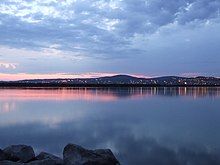
- Budapest
- Siófok , Lake Balaton
- Velence , Lake Velence - 15-20 km of Székesfehérvár. Swimming in a very childfriendly water, angling, boating, bathing, cycling, horse riding, sailing, This is also a popular place for the competitive road and mountain bikers.
- Veszprém
| Routes through Székesfehérvár |
| Nagykanizsa ← Siófok ← | W |
→ Velence → Budapest |


